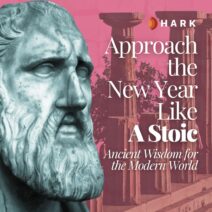A Stoic Practice for Overthinking: Suffering Less in Imagination

“There are more things, Lucilius, likely to frighten us than there are to crush us; we suffer more often in imagination than in reality.”
Seneca, Moral Letters to Lucilius, Book 2, Letter 13.4
We’ve all been there. Lying in bed at night, thoughts racing. What if I said the wrong thing? What if this decision ruins everything? How will I deal with tomorrow? Well, here’s a Stoic practice to keep us from overthinking.
Seneca’s wisdom cuts through that spiral: most of what scares us never happens. We suffer not from events, but from our own imagination.
The Mind Is a Storyteller
This quote from Seneca might be nearly two thousand years old, but it sounds like a modern diagnosis of anxiety. He is not saying that nothing bad ever happens. He is saying most of our suffering begins in our thoughts, not in the world. What frightens us is rarely what actually crushes us.
In fact, what affects us most is the story we build around what might go wrong. These imagined futures, often exaggerated and uncontrollable, hijack our present. They cloud our thinking, drain our energy, and delay action.
The Stoics knew this. And they offered tools, not just theories, to help us face fear without letting it dominate us.
How I Use This Practice
When I find myself spiraling into overthinking, I try to do what the Stoics would do. I pause and ask, “Is this a real problem now, or am I imagining it?” If there is something I can do, I do it. If not, I try to return to what the present moment requires: eating, sleeping, speaking, walking.
That act of grounding yourself in the now is not avoidance. It is clarity. It is a way of trusting that when a real challenge arises, you will meet it with strength. Until then, there is no need to live it twice.
Three Stoic Actions to Reduce Imaginary Suffering
1. Separate thought from fact
Ask yourself: Is this happening, or am I overthinking? Often, the fear is only a projection.
2. Return to the present task
When it is time to eat, eat. If it is time to sleep, sleep. Remind yourself that presence is your anchor. Worry cannot survive in a focused mind.
3. Reflect on your track record
How many things have you feared that never came true? How many hardships did you survive that you thought would break you? Let your past resilience speak louder than your imagined fear.
Stoicism Is a Practice, Not a Performance
Living Stoically does not mean pretending we are never afraid. It means recognizing fear when it shows up, and then asking: “What does the present moment require of me?” Often, the answer is far simpler than our imagination suggests.
Seneca’s line is not just poetic. This is a Stoic practice that keeps us from overthinking. It invites us to reclaim our peace by grounding ourselves in reality.
Here’s what you can do next.
Want to explore more Stoic strategies? Book a free consultation with one of our Stoic Coaches or read more on the Seneca Quotes page. Or listen to the Via Stoica Podcast on Spotify, Apple Podcast, or watch it on YouTube.
Watch the video we did on this specific quote on the Via Stoica Podcast here:
Author Bio
Benny Voncken is the co-founder of Via Stoica, where he helps people apply Stoic philosophy to modern life. He is a Stoic coach, writer, and podcast host of The Via Stoica Podcast. With almost a decade of teaching experience and daily Stoic practice, Benny creates resources, workshops, and reflections that make ancient wisdom practical today.
Related Posts
-
 Greek Stoic Philosophy Terms
Greek Stoic Philosophy TermsWhat Is Ekklisis? The Stoic Art of Avoiding What Harms Your Character
What Is Ekklisis? Ekklisis in Stoicism is the rational refusal to engage with what would damage one’s moral choice. The Stoic meaning of ekklisis is important because it teaches us what to turn away from, not out of fear, but out of commitment to living well. In daily life, ekklisis helps us step back from […]
Read more -
 Via Stoica Podcast
Via Stoica PodcastA Hark Audio Curated Stoic Playlist for 2026
At the start of a new year, there is often an unspoken promise that things will somehow be different. Calmer. More ordered. More predictable. Yet life rarely follows that script. Delays disrupt flights, plans break down, people drift away, and life brings events we cannot control. What we can work on, and what Stoicism has […]
Read more -
 Book Reviews
Book ReviewsThe Stoic Leader by John Sellars and Justin Stead
The Stoic Leader introduces Stoicism as a practical philosophy and explores how its principles shape leadership, judgment, and character in both work and life. Summary Written by John Sellars and Justin Stead, The Stoic Leader offers what is effectively two books in one. Sellars provides an introduction to Stoicism and its philosophical foundations, while Stead […]
Read more


Comments 0